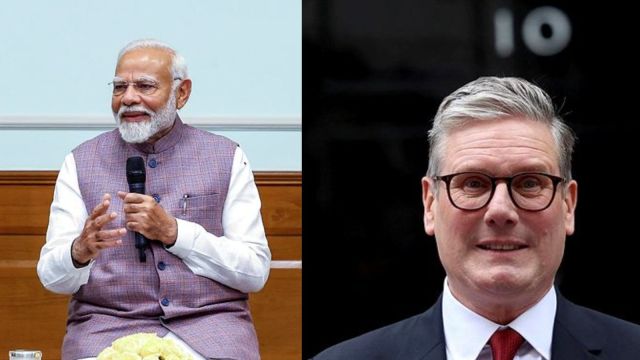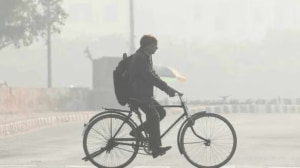A day after Keir Starmer led the Labour landslide to end 14 years of Conservative rule in the United Kingdom, Prime Minister Narendra Modi spoke to the new British Prime Minister Saturday and the two leaders agreed to work towards an early conclusion of a mutually beneficial India-UK free trade agreement.
Modi congratulated Starmer on assuming charge and on the remarkable victory of his Labour Party in the election. He also invited Starmer to India.

According to 10, Downing Street, the British Prime Minister, while discussing the FTA, said he stood ready to conclude a deal “that worked for both sides”.
Starmer also looked forward to further deepening the “strong and respectful relationship” between both countries, and welcomed Prime Minister Modi’s leadership on key global challenges such as climate change and economic growth, the British government’s statement said.
Downing Street said the leaders agreed there was a wide range of areas across “defence and security, critical and emerging technology, and climate change” for the two countries to deepen cooperation on – this reflects the Starmer government’s priorities.
Their conversation took place two days before Modi travels to Russia and Austria on bilateral visits, his first bilateral visit in the third term. His visit to Russia on July 8-9 will be his first since the start of the Russia-Ukraine war in February 2022, and coincides with the 75th anniversary summit of NATO leaders in Washington DC on July 9-11 — the summit, which will be attended by leaders of 32 NATO members including US President Joe Biden, may be Starmer’s first overseas visit as Prime Minister.
A statement by Prime Minister Modi’s office in New Delhi said the two leaders recalled the historic relations between India and the UK and reaffirmed their commitment to further deepen and advance the Comprehensive Strategic Partnership between their countries.
Story continues below this ad
Appreciating the positive contributions of the Indian community in the social, economic and political development of the UK, they agreed to continue to promote the close people-to-people ties.
Modi also extended an invitation to Starmer for an early visit to India as the two leaders agreed to remain in touch, the statement said.
In a post on X, Modi said, “Pleased to speak with @Keir_Starmer. Congratulated him on being elected as the Prime Minister of the UK. We remain committed to deepening Comprehensive Strategic Partnership and robust India-UK economic ties for the progress and prosperity of our peoples and global good.”
Congratulating Jonathan Reynolds on his appointment as UK Secretary of State for Business and Trade, Union Minister of Commerce and Industry Piyush Goyal said, “It was wonderful meeting you in person in Delhi earlier this year. Deeply impressed by your positivity and commitment to strengthening our bilateral relations.”
Story continues below this ad
“I look forward to meeting you again and jointly raising India-UK trade and economic ties to the next level. Wishing you a very successful tenure,” Goyal said in a post on X.
New Delhi and London have been negotiating the proposed FTA for over two years now, with a final deal expected to result in a mutual tariff relaxation on a range of goods such as cars, clothes, alcoholic beverages and medical instruments. While the Tories and Labour disagree on how to restrict immigration into the UK, there is a bipartisan consensus on the fact that it must be curbed.
With the UK being a powerhouse in the financial services and technology segments, India is seeking temporary visas for its service sector workforce. Given the political climate though, Labour is likely to negotiate hard on the visa issue.
On Friday, within hours of Labour’s landslide victory, Modi had congratulated Starmer on the “remarkable victory” and said he looked forward to “positive and constructive collaboration” to further strengthen bilateral ties.
Story continues below this ad
While there has been considerable work on the India-UK bilateral ties under the Conservative government in the last 14 years, the Labour Party and the Indian government have been reaching out to each other in the last one year — with at least four meetings between the two sides, and public statements by Starmer and positive statements by then Shadow Foreign Secretary David Lammy.
In November last year, External Affairs Minister S Jaishankar met Starmer, who was then Leader of the Opposition, and they had reaffirmed the bipartisan commitment towards strengthening India-UK relations. He had also met Lammy, with the two leaders holding discussions on security and development issues as well as bilateral cooperation.
This was followed by visits by Lammy and Reynolds who came to New Delhi in early February this year and met Jaishankar and Goyal. Incidentally, this was when both sides were in the middle of FTA negotiations.
In late February, Shadow Deputy PM Angela Rayner attended the Raisina dialogue, which is jointly organised by think tank ORF and the Ministry of External Affairs, and spoke about India being on course to become the third largest economy in the world. She also said it showed the progress India had made and a part of that was due to the policies that the Indian government had introduced around recognising women’s role.
Story continues below this ad
Starmer, who took over the reins of the Labour party soon after the defeat in the December 2019 elections, managed to move the party to centre-left, and has adopted what observers call “progressive realism”.
All these were efforts to assuage Delhi’s concerns about Labour party’s past record on speaking about Kashmir, human rights violations and offers of mediation in the dispute.
Indian diplomats, who have interacted with Labour leaders, say they are “cautiously optimistic” about Starmer’s Labour party-led administration. They say that while the centre-left party is “progressive” in its ideas and values, it is also going to be “realistic” in its strategy. They point to the party’s 2024 manifesto which frames the bilateral relationship: “We will seek a new strategic partnership with India, including a free trade agreement, as well as deepening cooperation in areas like security, education, technology and climate change.”
Indeed, Labour’s outreach towards India began last year when Starmer attended the Global India Forum conference and declared: “This is a changed Labour party.”
Story continues below this ad
Speaking to an audience that included the Indian and British High Commissioners and British Indian industry leaders, Starmer said that in India, he saw “a modern and a confident nation”, and that the challenge for Britain was to “cast aside the entitlement of history” and deepen its relationship with the modern and future India.

































